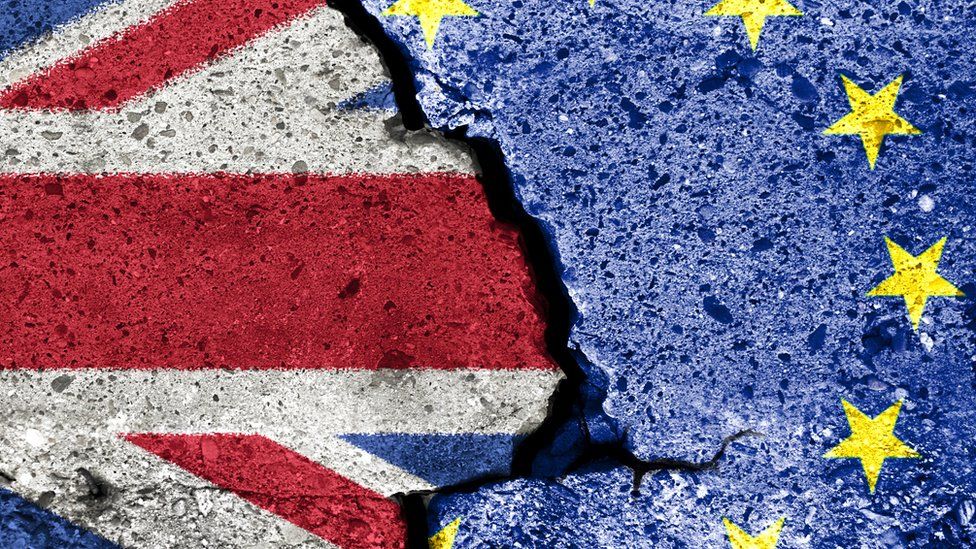Coveney stands firm on Irish Brexit position
- Published
- comments

The core Brexit issues on which Ireland reached agreement earlier this week are not changing, the country's foreign minister has told the Irish parliament.
Dublin would look at new proposals but its core position needed to remain intact, said Mr Coveney.
Negotiations between the UK government, the European Commission and the Irish government continued on Thursday.
European Council president Donald Tusk is now due to make an announcement about Brexit at 06:50 GMT on Friday.
On Monday, the UK and EU failed to strike a deal in Brexit talks when the DUP objected to the wording of a text on the future operation of the border.
It is unlikely the current phase of negotiations will be wrapped by the end of Thursday, says the BBC's Political Editor Laura Kuenssberg.
There is no sense of any real momentum in the talks, despite the hard work of all sides, she told BBC Radio Ulster's Evening Extra programme.
The real difficulty for UK PM Theresa May is that disagreement on a post-Brexit Irish border has sparked division within the Conservative Party on the differing versions of Brexit that could be tolerated by different parties, she added.
Tory divisions
The DUP's deputy leader Nigel Dodds MP left talks with representatives on the Conservative Party in Whitehall earlier on Thursday evening without comment.
Dublin's core issues are protecting the Good Friday Agreement, maintaining the integrity of the European single market and the all-island economy.
Would you notice if you crossed the Irish border? (Video from 2017)
Mr Coveney told the Dáil (Irish parliament) on Thursday morning that sensitive negotiations were ongoing and he would not make any statement that might create difficulties.
But he was insistent the Republic would not support anything that might lead to a hard border on the island of Ireland.
"The Irish government's position hasn't changed," he said.
The Irish government has demanded a written agreement from the UK that there will be no return to a hard border - one involving checkpoints or barriers - after Brexit.
Allow Twitter content?
This article contains content provided by Twitter. We ask for your permission before anything is loaded, as they may be using cookies and other technologies. You may want to read Twitter’s cookie policy, external and privacy policy, external before accepting. To view this content choose ‘accept and continue’.
Allow Twitter content?
This article contains content provided by Twitter. We ask for your permission before anything is loaded, as they may be using cookies and other technologies. You may want to read Twitter’s cookie policy, external and privacy policy, external before accepting. To view this content choose ‘accept and continue’.
Earlier, the Irish prime minister said the UK government planned to suggest a new wording for a Brexit deal on the Irish border within the next 24 hours.
Leo Varadkar said he had spoken by phone to UK PM Theresa May on Wednesday, adding that he wanted to move things forward and had indicated his willingness "to consider any proposals that the UK side have".
"Ultimately, it is up to them to come back to us, given the events that happened on Monday," he said.
On Monday, Mr Varadkar said he was "surprised and disappointed" a deal had not been reached, after the UK had agreed a text that met Irish concerns.
"I want us to move to phase two - if that is possible - next week, but the absolute red line that has been there for some time remains," he said.
"My responsibility as taoiseach (Irish PM) is to protect our fundamental national interest and that is the rights of Irish citizens in Ireland and Britain, and also the avoidance of a return to a border between Northern Ireland and Ireland."
The EU has agreed that Brexit talks cannot proceed to phase two - dealing with trade - until the Republic of Ireland is satisfied with a UK guarantee on the border issue.
The Democratic Unionist Party (DUP) has said it will not accept any agreement in which Northern Ireland is treated differently from the rest of the UK.
Mrs May's Conservative Party currently relies on the support of the DUP's 10 MPs to keep its minority government in power at Westminster.
'Pig's ear'
Earlier, veteran Conservative MP Ken Clark said the government had made a "pig's ear" of the border negotiations.
"They agreed this regulatory compliance on both sides, which is what a free trade deal requires, but unfortunately they didn't make it clear that's the whole of the United Kingdom," he said.
"I quite understand that in Ulster people don't want a different arrangement from the whole of the United Kingdom and to have new protectionist barriers on the Irish Sea."
He added: "They should have kept the DUP completely in the loop and discussed it with them and explained it with them as it went along.
"It's no good just reaching agreement with the taoiseach and then present it to the DUP who appear to have got the idea that somehow this was a special arrangement for Ulster."
The chair of Westminster's Brexit committee, Labour MP Hilary Benn, said it was right to describe Monday's deal collapse of as "a shambles".
He was speaking on a visit to the Irish border as part of a one-day fact-finding mission.
A group of 14 cross party MPs are meeting local business leaders in County Armagh as well as representatives from the police, customs, and staff from the North-South Ministerial Council.
Meanwhile, Sinn Féin's leader north of the border, Michelle O'Neill, said there could not be any "rollback" by the Irish government on its position, urging Dublin to be "very alert".
Mrs O'Neill added that the DUP did not represent the "majority view" in Northern Ireland.
- Published5 December 2017
- Published4 December 2017